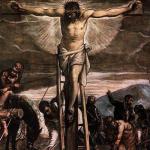STRUCTURE
There is a fairly clear chiasm in verses 11-17:
A. Dog returning to vomit, v 11
B. Man wise in his own eyes, v 12
C. Sluggard, vv 13-15
B’. Sluggard wise in his own eyes, v 16
A’. Taking dog by the ears, v 17
Perhaps the chiasm extends further. Verses 10 and 18 share the theme of someone who endangers all around him with a weapon – arrows in the one instance and a firebrand in the second.
From this structure, it is possible to take verses 12-16 as a whole as a section about the sluggard. Though verse 12 is phrased more generally than verse 16, it uses the same “wise in his on eyes.” The comparison in verse 12 suggests that the man who is wise in his own eyes is even worse than a fool, and the following verses suggest that the sluggard is that worse-than-fool.
PROVERBS 26:11
Dogs were sometimes domesticated in biblical times, beings used as watchdogs (Isaiah 56:10) and to herd sheep (Job 30:1). The overwhelming impression of dogs in the Bible, however, is negative. As Waltke points out, they eat “carcasses, garbage and corpses and licked the blood of the dead, a sort of scavenger” (Exodus 22:31 ; 1 Kings 14:11 ; 16:4; 21:19 , 23-24). In Psalm 22, dogs are the “evildoers” who surround the king, pierce his hands and feet, and join with lions and wild oxen to attack David’s life (vv. 16-21). They play a similar symbolic role in Psalm 59.
Two recurring features emerge from this portrait. First, dogs are defined by what they eat. They eat flesh and blood; they are cannibals and scavengers, refuse. Psalm 59:14-15 depicts the dogs prowling around looking for something to eat. Given the emphasis that the Jews later put on conformity to dietary regulations, it is not surprising to find the word “dog” used to describe Gentiles, who will eat anything, and it was probably also used of Jews who were lax about purity (cf. Matthew 7:6; 15:26-27). Second, dogs are urban scavengers. They are paired with birds, which are rural scavengers. Those who die in the city, and have no one to bury them, are eaten by dogs, while those who die in the country are devoured by birds of prey.
The first of these is in the background of Paul’s use of the word “dogs” in Philippians 3:2. There is clearly refers not only to “evil workers” in general, but more specifically to the “castration,” that is, to Jews and Judaizers. Jews considered non-Jews to be dogs, feeding on the carrion of paganism; Paul, by contrast, considers his own Judaism to be “rubbish” for the sake of Christ (v. 8), and yet the “castration” clings to the old and dying corpse of Judaism. Psalm 22 may be in the background; those who attack Jesus are the “dogs,” the leaders of Judaism, scavengers feeding on Jesus’ flesh, in a macabre inversion of the sacrament.
Proverbs 26:11 also describes the dog in terms of what he eats. Fools are like dogs who return to the vomit. They eat what is repulsive. 2 Peter 2:20-22 quotes this passage to describe the folly of the apostate who is delivered from the defilements of the world by the knowledge of the Lord Jesus, but later returns to the miasma that he has only recently escaped. The fool is the same. You can take a fool out of his garbage heap, but he’ll still long for it, and will return to it at his first opportunity.
The noun “vomit” is used only a handful of times in the Old Testament, usually in connection with the image of the “cup of Yahweh,” the cup of wrath that the Lord pours out to make nations drunk, to cause them to stagger and fall (cf. Isaiah 19:14; 48:26). Isaiah 28 gives a specific spin to this image by applying it to priests and prophets who “reel while having visions” and “totter in judgment” because of the strong drink of God’s wrath. They become so unstable that “all the tables are full of filthy vomit” (vv. 7-8). The verb is used a few more times, often with reference to the land “vomiting” out the inhabitants who practice idolatry and sexual sin (Leviticus 18:25 , 28; 20:22 ; cf. Jonah 2:10 ). In Revelation, Jesus threatens to “spew” evildoers out of His mouth; they will be vomited from His body.
Though vomit is never described as “unclean” in the Bible, it has the same “structure” as uncleanness. Bodily impurity is always something that comes from within the body and flows out; it’s something that crosses the boundary of the skin, and particularly of the sexual organs. Vomit, though, is particularly something that has been consumed and then expelled, through the same opening that it entered. Israel is supposed to be incorporated into the land, but if they sin the land will become sick of them and vomit them out to the nations. Israel ’s sacrifices were Yahweh’s food, and He is supposed to be pleased by them; but if they offer sacrifice while practicing injustice and secret idolatry, the Lord will reject their offerings. Believers are supposed to be “eaten into” Jesus, but Jesus rejects those who make his stomach sour.
The fool is given something worth eating, the bread and wine, or the honey of wisdom. Yet, the fool is incapable of incorporating that food into himself, and expels it. Instead of receiving wisdom and becoming wise, he delights in sniffing around at his own vomit. There may also be a reference to what the fool “spews out” of his mouth. Vomit is a good image of disgusting words, and the fool delights in words that repel others.
PROVERBS 26:12
Proverbs includes many warnings not to be wise in our own eyes. Early on, Solomon warns his son “Do not be wise in your own eyes” (3:7), and several times this self-satisfied wisdom is characteristic of a fool ( 12:17 ; 26:5). Wealth has a blinding effect, so that the rich are often wise in their own eyes (28:11): “I’m worth a billion dollars; how could I possibly be stupid?”
Eyes, as we have often said, are organs of judgment. A man who is wise in his own eyes is wise in his own judgment and estimation. He assesses his own wisdom, and his own wisdom passes the test. The ludicrous circularity is glaring: A man uses his own wisdom to judge whether his wisdom passes the test of wisdom. By contrast, Solomon says that the wise man humbles himself before Yahweh, fears Yahweh, and seeks the counsel of others (Proverbs 12:15 ).
Fools are often wise in their own estimation, but here Solomon distinguishes between fool and fool. Fools can be full of all sorts of folly – they might be babblers who can’t stop talking, angry people who flare up at the least provocation, sluggards. But as long as they don’t consider themselves wise, there is still some hope for them. But once a fool becomes a fool who thinks he’s wise, that hope fades.
PROVERBS 26:13-16
References to the sluggard are scattered about Proverbs (6:9; 13:4; 19:24 ; 20:4; 21:25 ; 22:13 ; 24:30), but this section is the most detailed portrait of this particular character. He is an important character in Proverbs. As Solomon tells us at the beginning of the book, getting wisdom requires exertion and perseverance, and the sluggard is incapable of both.
Solomon tells us that the sluggard is too lazy to eat (v. 15), and thus sloth leads to poverty. But Solomon also gives us a number of other insights into the slothful. Sluggards are full of ungrounded fear: “There is a lion in the street” (v. 13). This might be an excuse for inaction; it may be that the sluggard is not genuinely fearful at all, but simply wanting to find a reason to stay in bed. Perhaps, though, he has invented fears that keep him from acting. Sluggards manufacture threats; they are worse-case-scenario types, who think of all the ways something can go wrong rather than trying to figure out how things can be made to go right.
The sluggard makes no progress. He moves, but he moves only like a door turning on its hinges. Doors don’t get up and do creative things; they are locked to their frames, and the sluggard is locked to his bed. The image is complicated by the wording that Solomon uses. The word translated “hinge” is translated that way only here, and elsewhere refers to labor pains (1 Samuel 4:19 ; Isaiah 13:8; 18:2; 21:3; Daniel 10:16 ) or to messengers and ambassadors (Proverbs 13:17 ; 25:13; Isaiah 57:9; Jeremiah 49:14).
Perhaps we are to understand a door “groaning” on hinges; or perhaps the comparison of a door to a laboring woman is linked with the biblical picture of birth as an entry through a doorway (cf. Sarah at the doorway in Genesis 18). The reference to the sluggard may be to his writhing on his bed like a woman in labor. If so, the image is deeply ironic. A woman twists in labor on her bed in order to give birth to something, but the sluggard groans, tosses, and turns to give birth only to wind. He produces nothing.
Beds are obviously places for sleep, but beds are also places where people die. The same Hebrew word refers to beds and to biers (2 Samuel 3:31 ). The sluggard is as stuck to his bed as a corpse, and is as lively.
Finally, Solomon tells us that the sluggard, despite his fear, his excuse-making, his lack of life experience, still considers himself wise. It is easy to think you understand the world when you gaze at it from the distance and safety of a bed. The sluggard is a couch potato, and not just because he sits doing nothing; he is an armchair pundit who thinks he can solve the problems of the world without actually having to do anything.
As I’ve written previously on this site, sloth is not just laziness, but indifference, the attitude of “whatever,” the avoidance of seriousness, commitment, and the trouble that inevitably comes from involvement with others.















